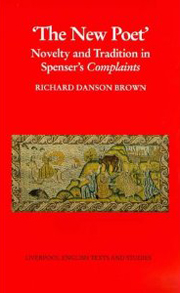Book contents
- Frontmatter
- Contents
- Acknowledgements
- Preface
- Abbreviations
- Introduction: ‘Subject unto chaunge’: Spenser's Complaints and the New Poetry
- PART ONE THE TRANSLATIONS
- PART TWO THE MAJOR COMPLAINTS
- Chapter Three: A ‘goodlie bridge’ between the Old and the New: the Transformation of Complaint in The Ruines of Time
- Chapter Four: Poetry's ‘liuing tongue’ in The Teares of the Muses
- Chapter Five: Cracking the Nut? Mother Hubberds Tale's Attack on Traditional Notions of Poetic Value
- Chapter Six: ‘Excellent device and wondrous slight’: Muiopotmos and Complaints' Poetics
- Chapter Seven: ‘And leave this lamentable plaint behinde’: the New Poetry beyond the Complaints
- Appendix: Urania-Astraea and ‘Divine Elisa’ in The Teares of the Muses (ll. 527–88)
- Bibliography
- Index
Chapter Four: Poetry's ‘liuing tongue’ in The Teares of the Muses
from PART TWO - THE MAJOR COMPLAINTS
- Frontmatter
- Contents
- Acknowledgements
- Preface
- Abbreviations
- Introduction: ‘Subject unto chaunge’: Spenser's Complaints and the New Poetry
- PART ONE THE TRANSLATIONS
- PART TWO THE MAJOR COMPLAINTS
- Chapter Three: A ‘goodlie bridge’ between the Old and the New: the Transformation of Complaint in The Ruines of Time
- Chapter Four: Poetry's ‘liuing tongue’ in The Teares of the Muses
- Chapter Five: Cracking the Nut? Mother Hubberds Tale's Attack on Traditional Notions of Poetic Value
- Chapter Six: ‘Excellent device and wondrous slight’: Muiopotmos and Complaints' Poetics
- Chapter Seven: ‘And leave this lamentable plaint behinde’: the New Poetry beyond the Complaints
- Appendix: Urania-Astraea and ‘Divine Elisa’ in The Teares of the Muses (ll. 527–88)
- Bibliography
- Index
Summary
The Ruines of Time reveals the tensions within Spenser's intellectual heritage and one way of resolving them. Through the figure of Sidney, the poem establishes an accommodation between the conflicting imperatives of poetic ‘eternizing’ and Christian world-contempt. Yet this accommodation is conditioned by the memorial context of The Ruines of Time, whose poetic concerns are a function of its wider purpose as a ‘thankefull’ elegiac ‘remembrance’ of Sidney and the Leicester circle. As the text which immediately follows The Ruines of Time in the Complaints volume, The Teares of the Muses continues to explore the tension between Christian and humanist views of poetry, but without the mediation provided by the mythologized Sidney. The Teares shows the Muses in despair. Confronted by ‘ugly Barbarisme, / And brutish Ignorance’, they bear witness to the fragility of poetry's cultural prestige. The poem dramatizes the sense, which often accompanies accelerated historical change, that society has lost all respect for traditional artistic values. Yet the Muses' complaints do not offer a unified response to a single threat; they continue the debate of The Ruines of Time by contrasting Christian and humanist poetics. Here the ongoing debate about the abstract value of poetry is given added resonance by the failure of all poetry – all the Muses – to revitalize a debased society. Spenser prophetically envisages the death of art in the Muses' closing silence: poetry's ‘liuing tongue’ can be silenced through social and intellectual atrophy.
- Type
- Chapter
- Information
- The New PoetNovelty and Tradition in Spenser's Complaints, pp. 133 - 168Publisher: Liverpool University PressPrint publication year: 1999

